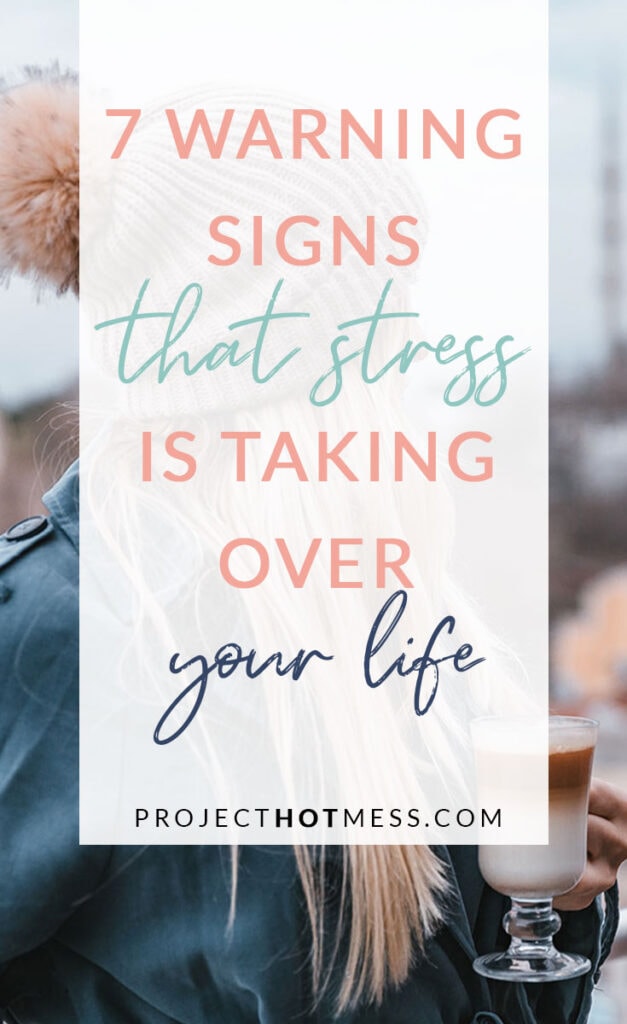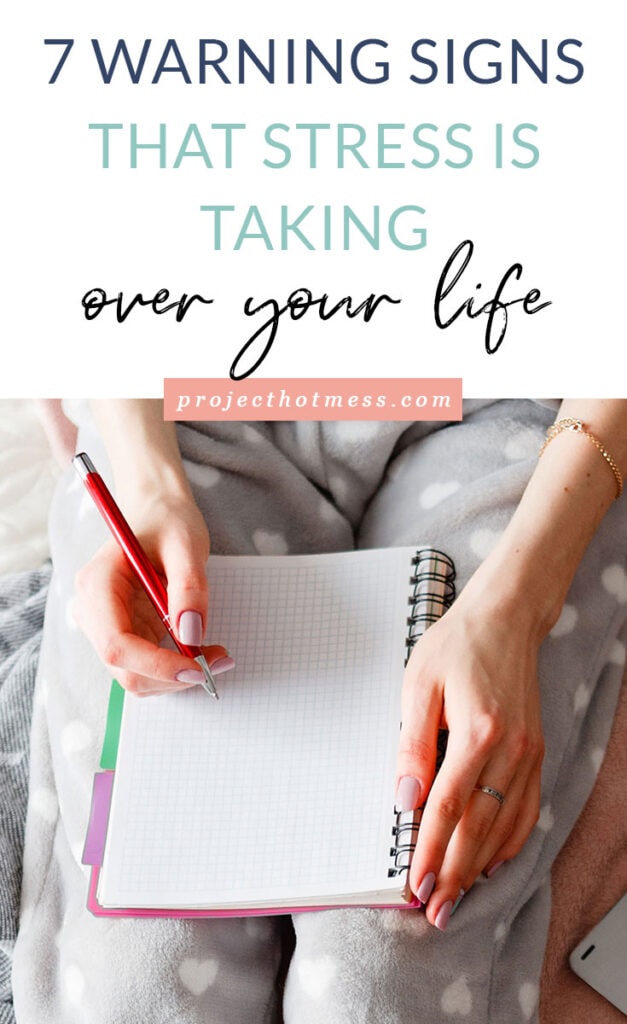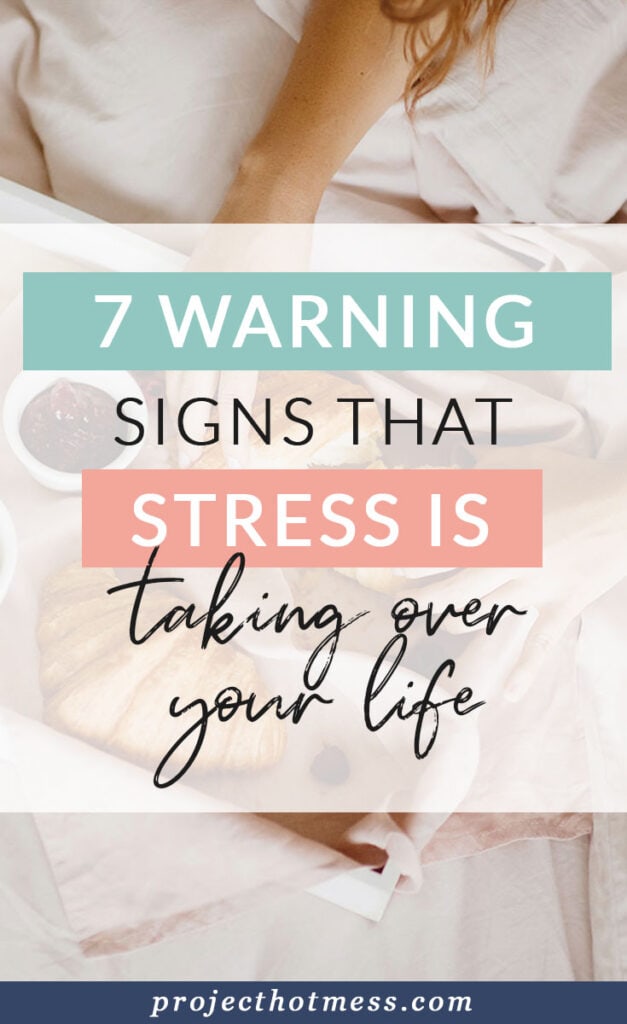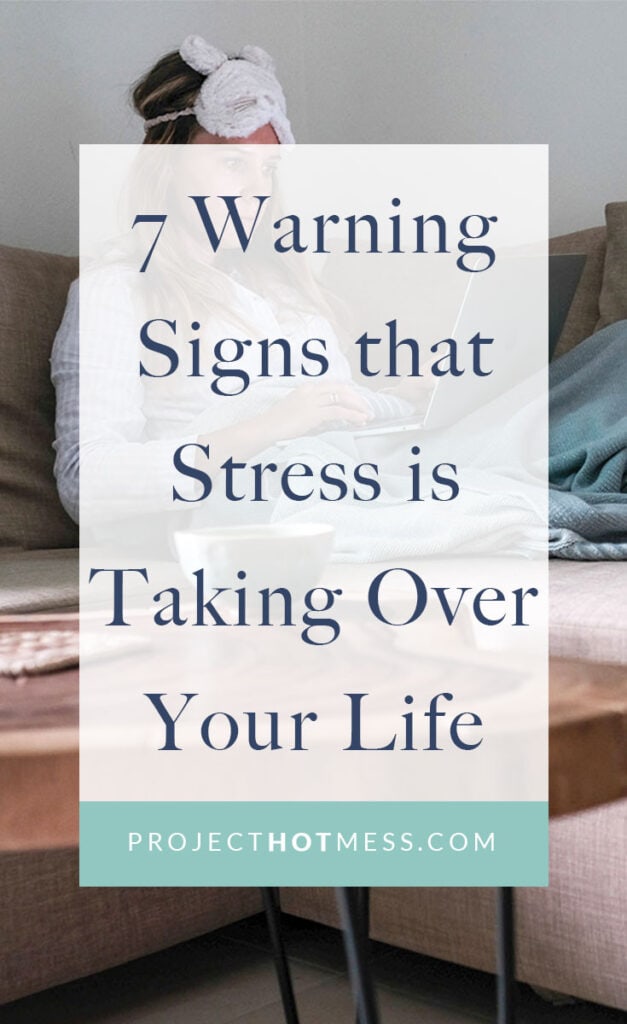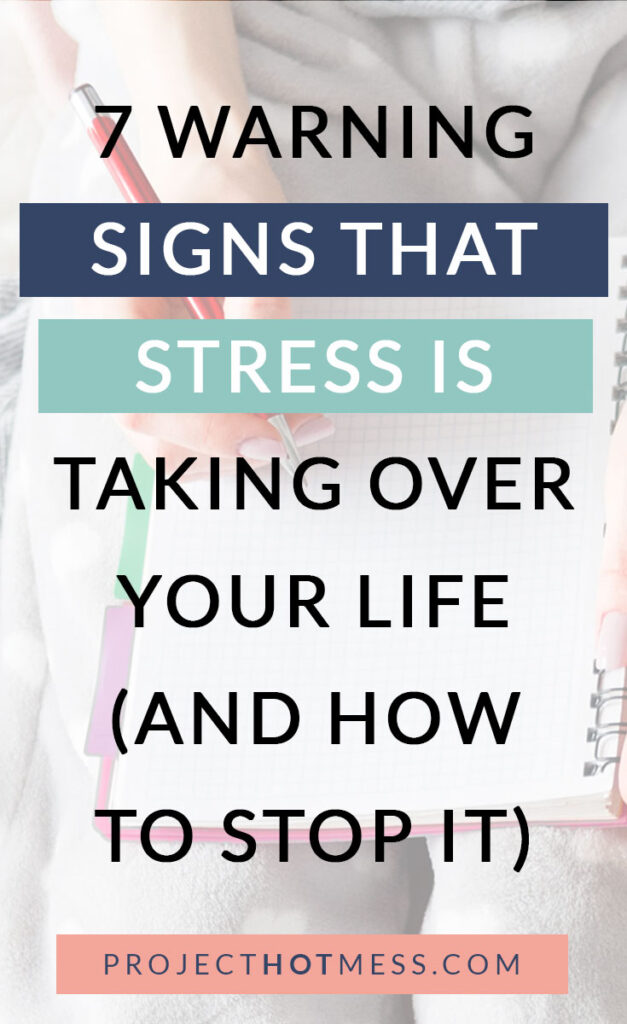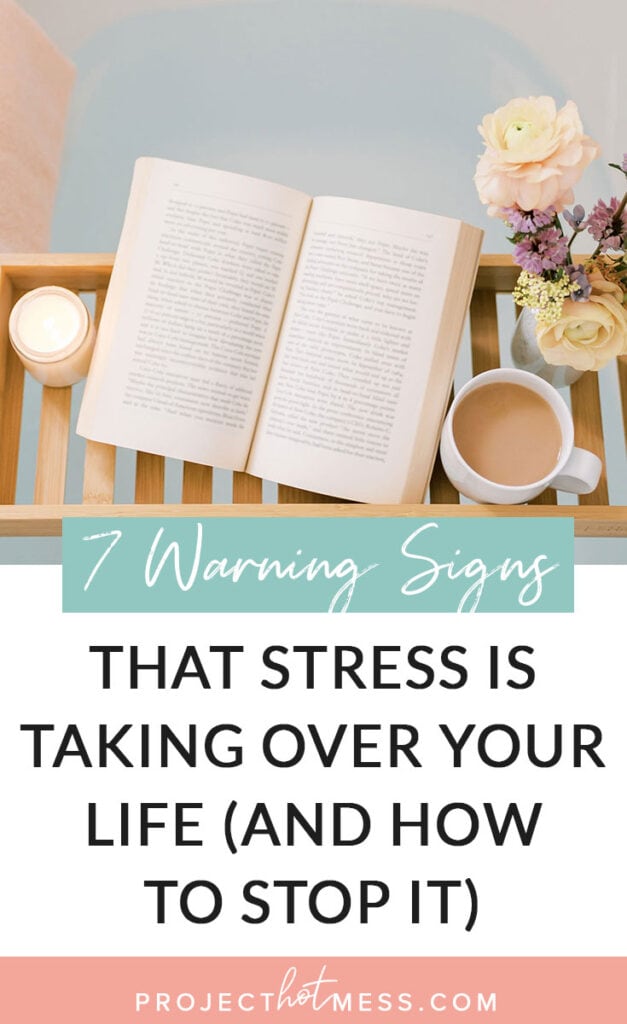7 Warning Signs That Stress Is Taking Over Your Life (And How To Stop It)
Stress gets a lot of attention these days. And it’s for a good reason. It’s one of the lead contributors to many of the top lifestyle diseases (think Cardiovascular Disease and Type 2 Diabetes) it wreaks havoc on our hormones, causes us to gain and maintain weight, and stops us from being able to sleep properly.
Yet we still have it in our day to day life, and most people don’t even realise it.
So what is stress?
Our body has a ‘stress response’ (aka fight, flight, freeze) that is designed to help keep us alive. Our brain is pretty darn clever and will do whatever it can to protect us.
When it senses a threatening stimuli, it sends a signal to produce cortisol, a neurotransmitter that creates a cascade of events including increasing adrenaline production, shunting blood from our peripheries and directing it to major organs, increasing blood flow to large muscles (to be able to run faster), slowing down our digestion (to conserve unnecessary use of energy), dilating our pupils, increasing our breathing rate, increasing our heart rate and blood pressure, and can even affect how we make decisions.
Sounds like a pretty good response when you’re standing in front of a sabre tooth tiger right?

Our stress response is what has allowed the human species to survive for so long. So, why is it now this same stress response that is killing us?
It’s simple – because we are always in a state of stress.
In our cavemen days, we would see a sabre tooth tiger, our body would have it’s life saving stress response (flight – we would get away) and then when we realised we were safe again, our cortisol levels would drop, our body would return to a state of homeostasis, and all would be good.
Now, our stress response comes in so many different forms that it is constantly stimulating our cortisol, and our body doesn’t return to its homeostasis levels. Our bodies are flooded with cortisol, which causes long term health issues.
So, how do we tell if our stress levels are starting to take over our life, and what do we do about it? First of all, we need to identify if we are having a negative response to stress in our life (because sometimes it’s not as obvious as what you think). These are some of the ways you might notice stress taking over your day to day life.

1 – You Feel Anxious And Maybe Even Nauseous As Soon As You Wake Up
We all get that ‘ugh, I have so much to do’ feeling some mornings, but if you’re waking up every day and you feel anxious, your heart is racing, or you feel nauseous, this is a big sign that your body is having difficulty regulating stress.
Pay attention to how you feel first thing of a morning. Are you over tired? Do you immediately think of all the things you have to do? Do you jump out of bed because you’re worried you’ll run out of time? Are you looking forward to your day or are you dreading it? Are the things that happened yesterday still weighing on your mind?
2 – You Have A Lot Of Difficulty Getting To Sleep and Staying Asleep
Stress often shows up in how we sleep, or rather, struggle to sleep. If you’re having a lot of difficulty getting to sleep at night, or staying asleep, this could be a sign that you’re stressed, even if you don’t feel like you are.
One of the reasons people have trouble falling asleep is because of a ‘racing mind’ or being unable to switch off at night. Not being able to get into a state of calm and of rest can be a sign that you’re cortisol is too high and you’re unable to regulate it. Similarly so if you’re waking through the night. If you’re waking up and thinking of all the things you need to do, then stress may be a problem for you.
This can happen intermittently and is normal on an occasional basis, such as if you’re preparing for something big at work and you’re having trouble sleeping the night before. However if this is happening frequently, then you may need to look into ways to reduce and regulate your stress.

3 – You Can’t Focus And Have Constant Brain Fog
You know that constant fog you feel in your head, like you can’t think straight or you have to concentrate really hard to maintain focus… that’s not normal! That can be a sign of mental fatigue that can come from running at high stress levels for a prolonged time!
The thing with this brain fog and lack of focus is that we often try and fix it with coffee, a stimulant, which just increases the effects of cortisol, and leads us into this cycle of brain fog – coffee – brain fog, on repeat!
4 – You Look For Alcohol Or Food To Help You Relax
How do you go about relaxing at the end of the day? Do you have a glass of wine or two (don’t even get me started on the normalisation of wine culture) or perhaps you dive into a block of chocolate and cookies?
Often people turn to drugs (and yes, alcohol is a drug, and food can be too, especially sugary food), to help relax when they can’t do it themselves. Unfortunately this doesn’t actually help our body to reduce it’s cortisol levels, so the detrimental effects are still present, and repeat themselves – leading people to continue their cycle of depending on alcohol or food to relax.

5 – You Have Persistent Headaches or Neck Pain
Stress can manifest in many forms, including physical pain. Often called tension headaches, or even stress headaches, you may find persistent headaches or neck pain are actually stress related. We hold a lot of tension across our shoulders, in our jaw (think tensed jaw), in our neck, and across our forehead. Often this tension and holding of muscles can lead to actual pain.
Pay attention to how your body is feeling, do you notice these tense contracted muscles? Are you holding your shoulders high and tight?
6 – You Find It Difficult To Be Happy Or Excited About Things
It is difficult for stress (cortisol) and happiness (serotonin) to co-exist and this is because prolonged increased levels of cortisol can lead to happy neurotransmitters, like serotonin, to not function properly. This can in turn lead to disorders such as anxiety and depression, which can be caused by chemical imbalances in our brain.
Also, if you’re always worried about things, about what’s happening next, about your to do list, or the things you should be doing, or what needs to be done, then it makes it very difficult to be excited and about about things coming up.
How do you feel about your immediate future? Do you have events coming up that you’re looking forward to?

7 – Your Relationships Are Starting To Feel Strained
Stress is exhausting, and as such it can leave us short tempered and a little snappy (okay, in some cases, a lot snappy). Often we take this out on those closest to us and it can leave our relationship feeling a little strained.
It may also be that we are so stressed that we work extra hard to do all the things, thinking that once these things are done we will be able to relax, but all it does is increase our stress and makes us have less down time to enjoy life and our relationships.
Have a think about what priorities you’re making in your life. Do your relationships and friendships come first?
If you’re nodding your head and thinking the above sounds a hulleva lot like your life, it’s okay. This isn’t the end of the road, you aren’t going to feel like this forever and feeling like stress is taking over your life doesn’t mean that you’re failing or that you can’t handle things.
There are ways you can reduce your stress and get you on the path to regaining control over your life.
1 – Evaluate What’s On Your Plate – Do You Need It All?
I have to admit, I am the Queen of doing all the things. I like being busy, and I often have more on my plate than I can handle. It wasn’t until a coach said to me that I can only ever actually give 100%, and it’s up to me what that 100% consists of that I realised I can’t keep adding more to my plate without taking something away from somewhere else.
She also said that I really need to have at least 10% of my time in reserve to allow for things that pop up.
So have a look at your day, at your week, at your month. What is taking up your time? Are you putting more on your plate than you can handle? Where is your 100% going?

2 – Say No
No is a complete sentence, but it’s so hard to say. However, saying no to others often means you’re saying yes to yourself and THAT is so darn important.
You don’t have to be everything to everyone. Saying ‘no’ and putting boundaries in place can actually make you feel better about things, stop you from spreading yourself so darn thin, and allow you to VALUE your own time.
3 – Ask For Help
Asking for help doesn’t mean you can’t do it on your own, it just means that you’re choosing not to because you realise you don’t have to.
There are many areas in your life you can ask for help, you could outsource things like grocery shopping, ironing, household cleaning. You could hire a babysitter, put your kids into daycare for one day a week, hire a tutor to help with your kids homework. You could create chore charts for your kids (and/or husband) and delegate household chores.
Perhaps it’s work that you need help with? You could tell your boss you can’t do everything they’re piling onto you and you need help. If you run your own business you could hire an assistant or a bookkeeper or someone to do the tasks you hate.
Or maybe it’s even at home, and there’s crappy jobs you don’t want to do – hire someone! Ask a family member for help!
Most people are willing to help those they love, and/or most jobs can be outsourced for someone else to do.

4 – Create A Plan
Planning your day and your week can help reduce stress so much. Taking a few moments at the start of the week to things like meal planning, or even just being aware of what is coming up in your week means that you’re able to go through your week prepared rather than reactive. It also means you can make less decisions, and less decisions = less stress!
Take some time to think ahead, look at your calendar, look at your week and plan! Those few moments will save you so much time in your week ahead.
5 – Make Time For Self Care
Self care isn’t selfish, it’s essential! Self care looks different for everyone, but it WON’T happen unless you make it. Schedule it as you would any other appointment and make sure you keep it. Even if it’s just 30 min a day to go for a walk, read a book, or drink your coffee while it’s still hot, whatever you need to do to get that time for yourself, make sure it happens.
Stress can creep into our lives in so many ways, often without us realising we are stressed (because we are so used to the feeling!). Ask yourself if you have any warning signs that stress is taking over your life, and if you do, start making steps towards identifying, and reducing the stress in your life.



